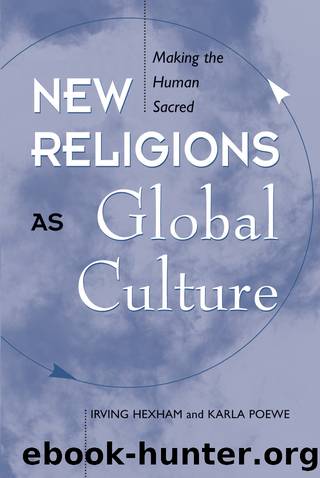New Religions As Global Cultures by Irving Hexham

Author:Irving Hexham [Hexham, Irving]
Language: eng
Format: epub
Tags: Social Science, General, Sociology
ISBN: 9780429967245
Google: -__EDwAAQBAJ
Publisher: Routledge
Published: 2018-02-12T04:42:07+00:00
The Nineteenth-Century Roots of Evolutionary Mythology
In many ways the situation we face today in terms of our collection of disconnected myths is similar to that the inhabitants of New England faced in the early part of the nineteenth century. Like us, these New Englanders experienced rapid social change, including revolutions in transportation and communication. Their society was transient and uprooted. Traditional beliefs were on the wane, and new ones vied for acceptance.
In the late 1820s, Thomas Dick wrote about the possibility of life on other planets in a book entitled Philosophy of a Future State (1828). Swedenborgians speculated about spiritual "worlds." Ethan Smith pondered the origin of the American Indians in his book A View of the Hebrews (1825). People were fascinated with the Indian mounds that dotted the landscape. Stories about the pyramids of Egypt and lost civilizations were common.
Against this confused and confusing background, Joseph Smith Jr. claimed to have discovered a book that explained the true facts about many of the puzzles that intrigued his contemporaries. In The Book of Mormon (1830), Smith laid the basis of a powerful mythology that wove together many diverse myths into an integrated whole. In his later "revelations," Smith elaborated these myths so that the developed mythology of Mormonism not only explained the origin of American Indians but also spoke about the significance of their archaeological sites and speculated about life on other planets.
Brodie contends that Smith "was groping for a new metaphysics that would somehow take into account the new world of science. In his primitive and egocentric fashion he was trying to resolve the most troublesome philosophic problem of the nineteenth century" (Brodie 1963:172). Thomas O'Dea has argued that although The Book of Mormon leaves much to be desired as literature, in its own terms and the context in which it was written it was a challenging document "concerned fundamentally with the problem of good and evil" (O'Dea 1964:26).
O'Dea cautions us against simply rejecting The Book of Mormon as an unbelievable and therefore unintelligible story. Rather, he maintains, it has an important intellectual element that gives its mythology an appeal far beyond the mere telling of tales. This element consists in the folksy but rational way in which Smith presents different viewpoints and argues for and against them. An important but often overlooked element of Mormon mythology that gives it a continuing appeal is its use of evolutionary ideas.
Download
This site does not store any files on its server. We only index and link to content provided by other sites. Please contact the content providers to delete copyright contents if any and email us, we'll remove relevant links or contents immediately.
Getting It, Then Getting Along by L. Reynolds Andiric(653)
Religion and Politics Beyond the Culture Wars : New Directions in a Divided America by Darren Dochuk(575)
Global Justice, Christology and Christian Ethics by Lisa Sowle Cahill(429)
Positive Psychology in Christian Perspective: Foundations, Concepts, and Applications by Charles Hackney(354)
Forgiveness and Christian Ethics by Unknown(348)
Douglas Hamp The First Six Days by Unknown(296)
The Horrors and Absurdities of Religion by Arthur Schopenhauer(271)
Insurgency, Counter-insurgency and Policing in Centre-West Mexico, 1926-1929 by Mark Lawrence(266)
Middle Eastern Minorities: The Impact of the Arab Spring by Ibrahim Zabad(250)
Christian Martyrdom and Christian Violence by Matthew D. Lundberg;(242)
The Oxford Handbook of Greek and Roman Mythography by R. Scott Smith;Stephen M. Trzaskoma;(235)
Beyond Heaven and Earth by Gabriel Levy(234)
God and Eros by Patterson Colin;Sweeney Conor;(230)
The Bloomsbury Reader in Christian-Muslim Relations, 600-1500 by David Thomas;(223)
Autobiography, Volume 2: 1937-1960, Exile's Odyssey by Mircea Eliade(216)
Witches: the history of a persecution by Nigel Cawthorne(211)
Cult Trip by Anke Richter(210)
An Introduction to Kierkegaard by Peter Vardy(198)
The Global Repositioning of Japanese Religions by Ugo Dessi(195)
